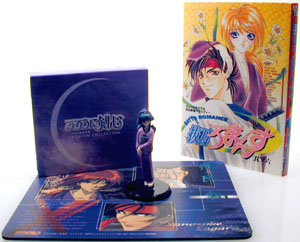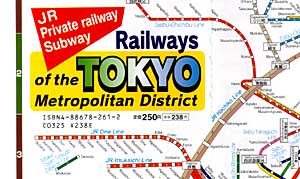by Ardith Santiago
|
Many scoff at the buying of anime goods, dismissing it as a childish waste of time and money. However, collecting character merchandise - especially at the end of a decade which saw a marked rise in North American anime conventions and a glut of collectors' editions marketed by distributors - has been a way for fans to interact and communicate on a more visceral level. I find it warmly fulfilling when I find an item from a beloved anime, a kind of memento that completes the experience of watching. And it increases the breadth of the discourse and joy I share with other fans, despite my awareness that some capitalist enterprise profits from my sentimentality. Of course, a trip to Japan should include the requisite sites (and by all means the country is rich in cultural history), but there are stores all over the place, if you know where to look. The trip to Japan seemed deceptively short. From Los Angeles, it took less than 13 hours to land in Narita, hardly enough time to prepare for my commercial feat. Character goods usually have a finite life span in Japan, product lines usually canceled along with the shows they help support. US popularity for shows often begins just as their character goods product lines end in Japan. In my case, I wanted to find some stuffed plushies known as UFO Catcher dolls, specifically UFO Catchers of the "Rurouni Kenshin" persuasion. These dolls, created especially for the claw grabbing game so popular in arcades all around the world, have been out of production for years.
The first thing I had to do was exchange money and get to my hotel. Some people feel safer carrying traveling currency with them, but exchanging money in Narita is simple and exchange outlets do not charge for the service. However, credit cards offer the best exchange rate, and allowed me to save my cash for the quaint little stores that don't take plastic. Thus equipped with my proverbial gold pieces, my next challenge was transportation. Taxi costs are exorbitant (about 600 yen or $6 for the first kilometer) so rail travel is the preferred way to traverse Tokyo, the average trip costing less than 300 yen (around 3 dollars US). Larger stations like Tokyo or Ueno offer free maps of the rail system in English at the exits. But the best way to get around is to buy your own comprehensive map that covers both trains and subways (two distinct systems with incompatible tickets) usually available at the larger stations for a few hundred yen. The one I bought called "Railways of the Tokyo Metropolitan District" featured Japanese and English texts on opposite sides of the page.
Where to go for goods depends a lot on how mainstream the anime is in Japan. If the show is really popular amongst children, department stores such as Daimaru, Mitsukoshi and Lumine may offer better deals than specialized stores such as Animate or Gamers, who actually create many character accessories and goods. A simple ride up the elevator to the children's department and lo and behold, a plethora of goodies. Last year, "Pok�mon" merchandise such as cookie cutters, frying pans and molds for parents to create pok� food for their kids lined the shelves. This past year, "Ojamaja DoReMi," a musical show about a witch, enthralled tikes all over Japan, sending their obedient parents clamoring to the department store. Needless to say I found no "Rurouni Kenshin" merchandise here. For this older title, more popular among teens and adults, I would have to plunge into the bowels of Tokyo consumerism.  Think of Shibuya, my first stop, as the Time Square of Tokyo - stepping out of the Hachiko exit, huge monitors flashing advertisements for hip music and jammin' clothes bombarded my vision as twenty-somethings roamed the streets copiously ducking in and out of Starbuck's. My destination was Mandarake, a punk/cave themed second hand novelty store famous for it's used manga and anime goods as well as used pop-culture items like vintage Coke machines. An anime collector's treasure trove filled with baskets, boxes, shelves of manga and anime items from every series imaginable, Mandarake beckons the avid collector to dig deep for the deals. |


